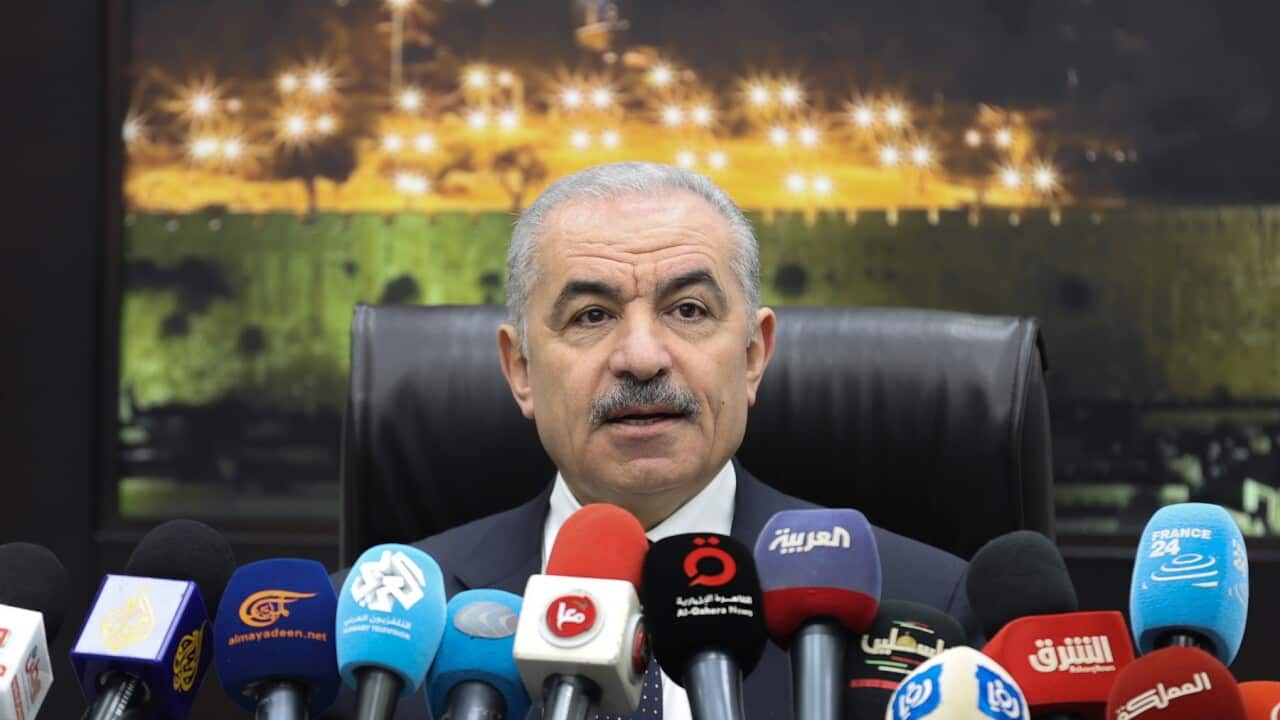TRANSCRIPT
Palestinian Prime Minister Mohammad Shtayyeh has offered his government's resignation to President of the Palestinian Authority Mahmoud Abbas.
The Palestinian Authority rules parts of the occupied West Bank.
He says he's resigning due to the escalating violence in the territory and the war on Gaza.
“This decision comes based on the political, security and economic developments that are related to the offensive on our people in Gaza, and the unprecedented escalation in the West Bank and Jerusalem, and to what our people and Palestinian cause are facing, as well as our political system that had been aggressively attacked in an unprecedented manner.”
It comes amid pressure from the US for the Palestinian Authority to work toward a political structure that can govern a Palestinian state when the war ends.
Israel says it will not accept Palestinian Authority rule over Gaza after the war and intends to maintain what it calls "security control" of the region.
The United Nations however, reacting to Mr Shtayyeh's resignation, reiterated support for the two state solution.
Stéphane Dujarric is the UN Secretary-General's spokesman.
“A strengthened, empowered Palestinian Government, that can administer the whole of the occupied Palestinian Territory, is critical as part of a path to achieving the establishment of a fully independent, democratic, contiguous, sovereign and viable Palestinian State, on the basis of the 1967 lines, of which Gaza is an integral part, which remains the only way to achieve a lasting peace.”
Israeli Defence Minister Yoav Gallant says Israel is escalating its assault on hostile militant groups in Gaza and Lebanon as the military says its air force has struck targets of the militant Hezbollah group “deep inside Lebanon."
Lebanese officials say the targets were hit near the northeastern city of Baalbek.
A Hezbollah spokesman says at least two of the group's members were killed in the strikes.
The strikes near Baalbek are among the deepest into Lebanon since a January airstrike on Beirut killed top Hamas official Saleh Arouri.
Minister Gallant says Israel is ready to act against Hezbollah 'everywhere'.
“If there is anyone here who thinks that when we will reach a deal to release hostages in Gaza and the fire stops, this will make things easier than what is happening here, they are wrong. We will continue the fire and we will increase it regardless of what is happening in the south, until we achieve our goals. The goal is simple - to withdraw Hezbollah to where it should be. Either by agreement, or we will do it by force.”
In Geneva, Saudi Arabia's foreign minister has addressed the UN Human Rights Council and called for an end to the war in Gaza.
Prince Faisal Bin Farhan Al Saud says Security Council Resolution 27-20 needs to be implemented to lift restrictions on aid delivery to Gaza in order to alleviate the human suffering.
And he says Palestinians have the right to self-determination and an independent state.
“We should dissipate doubts about the right of Palestinians to live in security and their right to self-determination through a legitimate process that is irreversible for them to have their independent state on the 1967 border, with eastern Jerusalem as its capital on the basis of the Arab Initiative and the relevant UN resolutions. We call upon all countries to adhere to the principles of peace and justice and to work together in order to end what we can call collective punishment and its serious ramifications.”
Israeli Prime Minister Benjamin Netanyahu says a military offensive in Gaza's southernmost city of Rafah could be delayed if a deal is reached for a weeks-long cease-fire between Israel and Hamas.
He claims total victory in the territory would come within weeks once the offensive begins.
Talks have reportedly resumed in Qatar at the specialist level, with discussions expected to follow in Cairo with the aim of achieving the cease-fire and release of dozens of hostages held in Gaza as well as Palestinians imprisoned by Israel.
Humanitarian groups are warning of a human rights catastrophe if the Rafah offensive goes ahead as over half of Gaza's population is sheltering in the region which had previously been designated as a safe zone.
Rafah is Gaza's main entry point for aid and the U-S and other allies say Israel must avoid harming civilians.
Speaking at an economic conference in Abu Dhabi, Israel's Economy and Industry Minister Nir Barkat says Israel is committed to winning the war in Gaza and eliminating Hamas regardless of the economic toll on the country.
“As I said, I think Israel is committed to take, to overturn every rock and stone to figure out if we can release our hostages. But if Hamas thinks that we're going to end this with them returning to power, they're wrong. We will not let that happen.”
Mr Barkat, who is widely seen as a potential candidate to succeed Prime Minister Benjamin Netanyahu, made clear that national security was not only paramount but also vital for Israel's economy.
Meanwhile the United Nations' highest court has heard the final day of arguments on the question of the legality of Israel's occupation of Palestinian Territories since 1967.
The International Court of Justice has heard statements from Turkiye and the Arab League on the historic question.
Israel has not been present at the hearings, but filed a written submission last year, arguing that the questions put to the court are prejudiced and ignore its right and duty to protect its citizens.
Turkiye's Deputy Foreign Minister Ahmet Yildiz says the occupation and failure to move toward a two-state solution is the "real obstacle" to peace in the region.
“The unfolding situation after October 7 proves once again that without addressing the root cause of the Israeli-Palestinian conflict there can be no peace in the region. The Israeli-Palestinian conflict did not start on 7th October 2023. The conflict is not about a certain Palestinian faction or group, the conflict dates back to an earlier century.”
The 15 international judges in The Hague will eventually provide a non-binding advisory opinion, following a 2022 request by the U-N's General Assembly.













